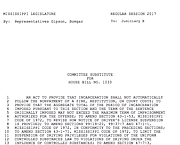The House Corrections Committee passed a bill that would give judges further discretion in sentencing youth tried as adults for murder charges. Photo by Imani Khayyam.
A man walked up Highway 25, no belongings with him, just the clothes on his back on a rainy, dark night earlier this month. He stuck his thumb out as cars flew by. A man then took pity on him and pulled over.
The driver asked the walker where he was headed. "Columbus," the man answered, referring to a town 153 miles northeast of Jackson. The driver quizzed him to find out why he would be walking up a highway on a stormy night.
What happened to his ride?
They never showed up.
After several years in state prison, the man was dropped in Jackson upon his release—most released prisoners get $20 and a bus ticket—where there was supposed to be another vehicle to take him home.
It never showed up.
So with nothing to wear over his thin T-shirt, the man just started walking.
The driver gave him money for a hotel room, and made sure he had a place to stay for the night—and enough money to get home.
U.S. District Judge Keith Starrett told this man's story to the Mississippi Reentry Council on Jan. 20.
"We can't fathom being that desperate that we would begin walking from Jackson to Columbus because we didn't have anything else to do, but (there was) no other way to get there," Starrett said.
"Folks ... if we have the right programs in place in communities, I don't think that would have happened."
Starrett said the man's story is an indicator of the broken systems and patchwork of services that Mississippi offers to inmates and those leaving prison—a pivotal time for re-offending. The lack of re-entry strategies and programs to help them turn a better direction is at least partly to blame for their recidivism.
The Reentry Council has been working to make it easier for inmates to find jobs and re-acclimate to life free from bars. Starrett says the ultimate goal of the council is community safety. Legislation is necessary for some of those changes to the state's criminal justice system, and this session lawmakers have taken a multifaceted approach, with several avenues for change to happen.
Halting Recidivism
In 2015, Mississippians leaving prison and then re-offending started to decline after the Legislature passed a massive criminal-justice reform bill, House Bill 585, in 2014, in order to address the overcrowded state prisons. Inmate population soon dropped from around 20,000 to 18,000. But now the numbers are rising again. The Mississippi Department of Corrections currently has 18,865 inmates in custody, as of Jan. 28, their daily inmate population shows.
MDOC Commissioner Marshall Fisher told a House appropriations subcommittee in January that his top priority is recidivism—when a former criminal commits another crime and re-enters the corrections system—which is at least in part responsible for why the state's criminal custody numbers stopped declining.
The current rate is at 38 percent, and Mississippi has the fifth-highest state imprisonment rate, an analysis of 2014 Bureau of Justice data compiled by the Sentencing Project shows.
Steven Pickett, the chairman of the parole board, told the Reentry Council on Jan. 20 that the biggest indicators he sees for bringing people back to the corrections system—whether that be having parole revoked and going back to prison or violating parole in general—are addiction, homelessness and then those who cannot "function in the free world."
Parole revocation numbers also climbed in 2016, indicating that, as Fisher said, recidivism needs to be a priority for the department going forward.
Addiction is also common among inmates behind bars, Fisher told the subcommittee last week. He estimated that of the state's 18,814 inmates at that time, 14,729 are suffering from a self-reported substance-abuse problem or a mental-health issue.
"We think it makes sense to revamp our alcohol and drug programs simply because of the numbers I just gave you," Fisher told House lawmakers last week.
MDOC is doing a partner pilot program with the Department of Mental Health that will help inmates suffering from both a substance-abuse addiction and a mental-health disorder that about 90 inmates will start soon.
Of course, one program does not cover all inmates, and Fisher has repeatedly emphasized to lawmakers over the past year that he does not have the resources he needs to provide mental health care for inmates. The majority of inmates at East Mississippi State Hospital suffer from sort of mental illness, Fisher told lawmakers this summer.
Often, inmates receiving treatment—or at least medicine—while in prison are discharged with no more than 30 days' worth of medication, Fisher said.
It is difficult for MDOC to follow up with those inmates or ensure they are able to continue to get medical care and attention once they leave.
Expanding mental-health courts in the state could be a place to start.
'A Forever Deal'
Rep. Becky Currie, R-Brookhaven, has introduced mental-health court legislation several times before this session, but this year, she has more support than in years past. With a little over 3,000 inmates currently receiving mental-health treatment, mental-health courts are a solution that could catch those inmates before they even enter MDOC's custody.
House Bill 489 authorizes courts around the state to start mental-health courts under the purview of the Administrative Office of the Courts. The program will work much like drug courts work now. Mississippians charged with most nonviolent crimes (there are exceptions in the bill), who courts determined likely committed a crime due to mental-health conditions, are eligible for the program.
If a judge sentences a person to mental-health court, he or she must pay a minimal fine and comply with the court's instructions. Funding for the bill would come from the additional money appropriated from the Legislature and separate appropriation bills, but no funds are directly attached to Currie's bill.
Eventually, the strategy would pay for itself, like the drug courts do, and regional mental-health clinics would ideally supply the courts with a staff member to work with people in the program. Once offenders complete it, their felonies would be expunged, Currie said.
"We would not be locking up so many people that are mental-health patients that just get off their medicine and did something where they ended up in jail," Currie told the Jackson Free Press.
Currently, Currie said, too many people with mental-health needs are put into jail where they are not receiving mental-health care.
"It's a disservice to the patient, and as a registered nurse, I see this a lot, and it's a disservice to the taxpayers' dollars that we're incarcerating all of these people, and they just needed mental health(care)," she said.
Currie said it will take about a year to set up the program, and individual courts will have to opt in—the bill does not require courts to participate.
The Department of Mental Health and the Department of Corrections are both on board, Currie said, and the judges will need to buy in because the program will be optional for courts to implement.
Other states have tried this program and found it to work. In Louisiana, the state saved $36 million over a few years on medicine alone because the corrections department is required to pay for inmates' health care. In MDOC's case, health care for inmates is contracted out, in a pricey $149-million, three-year contract with Centurion, contracts on the Transparency Mississippi website show.
"(Mental illness) is not something you get over; you don't get cured from it, so this is a forever deal," Currie said. "And you know at some point we have to have some compassion, and this is to me a very compassionate bill and for people who don't think it's going to work or don't get it on board, maybe you've lost your compassion for the mentally ill."
Parole Problems?
The parole board meets in what could be a movie set. One oblong granite-topped conference table sits at one end of the room with five comfortable office chairs around it, one at its head for the chairman. The chairman's seat faces a large-screen television that has an orb-like video camera sitting on top of it. The five-member parole board uses the apparatus for interviews with every single inmate who applies for parole.
The parole-board room has windows on one side, behind the TV, but otherwise, it is a narrow room that likely makes for long days. A pile of quality snacks—cheese puffs Oreos, chips—sits in the corner.
"There are days we come here at 9:30 (a.m.) and sit around this table and don't leave," parole-board member William Townsend told the Jackson Free Press.
Chairman Pickett, who was a Hinds County deputy under now-deceased Sheriff Malcolm McMillin, says his team gets through all the cases they have each month, and that number can vary from month to month. In November, 1,200 inmates asked for parole; only 683 applied in December. The governor-appointed board has managed to clear its backlog, meaning it can take cases as they come in.
The parole board has drastically increased its hearing numbers. In 2011, the board heard just shy of 6,000 cases. Last year, it heard upwards of 10,000. Of those, the board paroled 6,089 inmates.
The parole process is complicated and complex. The parole board has hearings and interviews with victims, family members, law-enforcement officers and other witnesses. Almost like a jury, the board hears all sides of a story—a process that can wear on members emotionally.
Then members interview the inmate in prison, sometimes sitting with his or her lawyer, via satellite television from seats in the control room.
Once the board decides to grant an inmate parole, the prisoner must sign a statement of parole and agree to regularly report to a field officer, not change his or her address or leave the state, seek employment, not possess illegal drugs or firearms, or visit correctional facilities. The board only sees inmates again if they violate this contract.
Inmates violating parole must appear for revocation hearings. In 2016, the board had 3,123 hearings, and revoked parole of 1,443 of those former inmates, who had to return to MDOC's custody. The board was able to send 473 of them to the technical violation center, sort of an in-between for those who violate parole but don't need to be back in prison.
One of the biggest challenges when paroling inmates, board members said, is finding permanent housing for inmates. If an inmate does not have a permanent place to go, the board really cannot parole that inmate. Commissioner Fisher told House lawmakers last week that his department is in dire need of more transitional beds for inmates in this exact predicament.
The department has 120 beds now, and Fisher told the House appropriations subcommittee that 191 more inmates are eligible now and have provisional parole but do not have a permanent residence plan.
No Longer Jailed for Fines?
When Jackson man Cedric Willis left the Mississippi prison system in 2006 after serving 12 years for a crime he didn't commit, he walked out without a dime to his name. While he was in the system, he got no education, no job training, and he did not know how to use a computer when he came home. He didn't have a car waiting for him back in Jackson, and it took him days to get a driver's license because his paperwork was out of date, he later told the Jackson Free Press.
"They didn't give me nothing," he later said of his release.
And Willis was innocent. The state has not historically had a transition strategy for former inmates whether they committed the crime or not.
Starting over is challenging for former inmates, especially with no job or money waiting back home. Transportation alone can pose enough of a challenge for former inmates looking for work.
In Willis' case, Galloway Methodist Church in Jackson gave him a job and helped raise money for a car for him after his story came out in the Jackson Free Press—but most former inmates do not get those offers. In addition to those barriers, court-imposed fines and fees can lead to further incarceration if a person cannot come up with the money to pay off dues (for drug court or child support, for example), and they land right back in prison or jail.
Part of Rep. Andy Gipson's re-entry-reforms bill addresses this issue, prohibiting judges from throwing people in jail just because they are unable to pay their court-ordered fines, like child support, drug court or other fees relating to a person's charges. Judges could set out a payment plan or assign community service in lieu of payment under the Braxton Republican's bill.
"The goal of the judicial process ought to be to rehabilitate, so that when the offender has paid their dues and done their time, they come out and become a productive member of society again, become gainfully employed, become a taxpayer and move on and get off the cycle of incarceration," Gipson told the Judiciary B committee, which he chairs, on Jan. 26.
Gipson's bill contains more of the Reentry Council's recommendations, including not taking away a person's driver's license for any drug violation. He told his committee that Mississippi is one of 12 states with a policy mandating that any drug violation means a person gets his or her license revoked.
"We would be joining 38 other states to say no to automatic revocation of driver's licenses unless it's a driving-related offense," Gipson said Jan. 26.
The bill would also allow some inmates to be eligible for parole after serving at least 25 percent of their sentences—this would not apply to violent crimes, drug trafficking or habitual offenders, however.
House Bill 585, passed in 2014, addressed in parole eligibility, but several lawmakers agreed at the House appropriations sub-committee meeting that some judges have started giving maximum sentences, knowing that the accused person will not serve their full time.
"From one county to the next, we have a sentencing disparity, for the same crimes, the same amounts involved, and in one county they're getting two or three years, and someone right across the river (is) getting 30 years—justice is not being applied equitably," Gipson said at an appropriations sub-committee in mid-January.
Rep. Charles Young, D-Meridian, and Rep. Angela Cockerham, D-Magnolia, both agreed that this was a problem with House Bill 585. The bill gave judges discretionary privileges because sentencing requirement was left open and flexible. The Legislature set maximum sentence limits but nothing else.
"So, in some cases, that discretion is being abused, and that's why costs and recidivism (rates) have gone up," Gipson said in that subcommittee.
Gipson brought this up in the Judiciary B Committee meeting on Jan. 26 and later told the Jackson Free Press that he plans to research which crimes draw the most disparities from judges. Gipson said the work will continue to figure out "how can we make sure we administer fair justice across the state, not in one district and not another one."
House Bill 1033 passed out of committee last week, and Gipson said he believes the bill has broad support.
Juvenile Sentencing, Banning the Box
Sen. Derrick Simmons, D-Greenville, routinely introduces criminal-justice reform measures that routinely die on the vine. One of those bills, Senate Bill 2080, addresses juvenile sentencing, which was not brought up in the Senate Corrections Committee and died on Jan. 31. While Simmons' bill might not see the light of day on the Senate side, the House Corrections Committee did pass House Bill 920 onto its calendar.
The bill would set limits on how long a juvenile offender can be sentenced to prison. In the cases of first-degree or capital murder, minors can still get a life sentence or a 25-year minimum and 50-year maximum stay in MDOC's custody. The bill would bring Mississippi's law in line with a 2012 U.S. Supreme Court decision in Miller v. Alabama that found that sentencing a juvenile to life in prison without parole eligibility violates the Eighth Amendment.
Rep. Robert Huddleston, D-Sumner, tried to pass an amendment that lowered those minimum sentencing years to 15 and 25, respectively, but his amendment did not pass. Rep. Charles Young, D-Meridian, voiced his concern in committee that the bill seemed to set a stronger sentencing standard for youth tried as adults, but Rep. Bill Kinkade, R-Byhalia, said the bill does just the opposite, and follows the Miller v. Alabama precedent.
Simmons' bill, Senate Bill 2080, would have gone much farther than House Bill 920. His legislation would allow youthful offenders who were sentenced to life imprisonment to be eligible for parole after serving 10 years of their sentence.
"That's just something that we need to do, we need to treat our juveniles like juveniles and our kids like kids," Simmons told the Jackson Free Press.
The Senate Corrections Committee passed a "Ban the Box" bill out of committee on Jan. 30, with the aim of helping former inmates find employment once released. The bill would allow any former inmate not convicted of embezzlement or a violent crime to get their record expunged, as well as prohibit any public or private employer in the state from inquiring into an applicant's criminal record until they have been selected for an interview.
Sen. Brice Wiggins, R-Pascagoula, said he was concerned about the broad range of felonies that would qualify for the expungement portion of the bill as well as what research says about "Ban the Box" measures. The committee voted to insert a clause in the bill that allows it to move forward but could easily kill it in the future, pending more research.
Research shows that jobs and employment can keep formerly incarcerated people from re-offending, and federal employment applications do not have the "box" because President Barack Obama banned them. Neighboring states have also banned the box on state employment applications.
Two recent studies show that "Ban the Box" measures might lead to discriminatory practices in hiring, however. One from the University of Michigan found that "BTB may open doors to some applicants with records, but this gain comes at the expense of another group that faces serious employment challenges: black men."
That is, without the box, the study indicates that some employers might then eliminate black men from consideration altogether, giving "a clear advantage (to) white applicants who receive 23 percent more callbacks compared to otherwise identical black applicants."
The study says this unintended consequence of the policies, implemented at local, state and federal levels around the country, does not mean the BTB policies won't work.
"[E]ven if ("Ban the Box") increases racial discrimination by employers, it does not necessarily follow that it will increase racial disparity in employment on balance," University of Michigan researchers wrote in their June 2016 study.
Researchers suggest that policymakers consider banning the box policies in accordance with other interventions in order to reverse the adverse effects against young men of color.
"Race-based statistical discrimination in hiring is unlawful, and if the hiring discrimination laws were effectively enforced or operated as an effective deterrent, BTB could not have this unintended consequence," the Michigan study reported.
The Senate "Ban the Box" bill will have to make it out of the Senate Finance Committee in order to survive the legislative process, and it was not clear by press time if it would pass or not.
Countering Progress
Even as legislators are considering reform measures to stem the growing number of inmates—legislation probably not possible a few years back—other proposed legislation would increase penalties for crimes.
Increasing penalties for crimes and felonies could add to the state's growing number of inmates, and lawmakers are also looking at some bills this session that would increase penalties for crimes, including "Blue Lives Matter" legislation filed on both sides of the statehouse and the political aisle as well.
The Senate passed the "Blue, Red and Med Lives Matter" bill to categorize assaults on law-enforcement personnel and even firefighters and security guards as "hate crimes." Mississippi already has enhanced penalties for assaults on law-enforcement officials. Simple assault on a normal citizen earns a person a $500 fine and/or six months in jail. Simple assault on a law-enforcement officer, legislator, judge or some other state, district or public official or actor (like bus drivers and social workers) as defined in state law comes with a penalty of $1,000 and/or up to five years in jail.
For aggravated assault on a regular citizen, the punishment can be one to 20 years, but on a law-enforcement officer or other official or state actor, the punishment is a maximum sentence of 30 years with a possible $5,000 fine.
Some Democratic lawmakers argued this point when Senate Bill 2469 came up for a vote last week. The bill, which passed after almost two hours of debate, would double the penalty for any felony or misdemeanor—from resisting arrest to murder.
Critics of these policies say attacks on law-enforcement officers is not up, like many proponents of such measures say. FBI statistics show that assaults and murders on law enforcement officers peaked in 2011. In 2015, 41 officers were feloniously killed, FBI data show, while in 2011, 72 officers were killed.
The Legislature also is debating increased penalties for people caught selling drugs within 1,500 feet of a rehabilitation facility. Rep. Charles Busby, R-Pascagoula, authored the bill and explained it on the House floor on Jan. 24. He said one of this constituents called him about a situation with their family that inspired the bill.
Rep. Adrienne Wooten, D-Jackson, pushed back on Busby's suggestions.
"Why do we not have a bill down here that takes care of both sides of this issue?" Wooten asked, meaning rehab and sales.
"I view those who are selling it as a greater bad," Busby said.
The bill, House Bill 515, was put aside after Rep. Mark Formby, R-Picayune, introduced an amendment that would increase the penalty for those selling drugs within the same distance of jails or prisons. Democratic lawmakers pushed back on his amendment, and the legislation—and specifically Formby's amendment—was still pending legal review at press time.
In addition to reforms, lawmakers must grapple with MDOC's budget deficit this year even after the department reduced vehicle purchases, extra expenditures and their contract obligations. MDOC will post about a $10.4-million deficit in its current fiscal-year budget.
Commissioner Fisher is still requesting less money than he did last year, but he emphasized the need for money for his correctional-officer staff, which has a turnover rate of 38 percent, at the January House Appropriations subcommittee meeting. Gov. Phil Bryant named Fisher the new commissioner of the Department of Public Safety on Monday, which the Senate will need to confirm. Pelicia Hall, the MDOC chief of staff, was named acting commissioner on Monday, Jan. 30.
How lawmakers will deal with budget deficits remains to be seen, but at least for now, some lawmakers have gotten serious about criminal-justice reforms getting onto the calendar. It is too early to tell which reforms will take hold and survive the legislative process.
Email state reporter Arielle Dreher at [email protected]. Follow legislative developments on these bills and more at jfp.ms/state and for live updates follow Dreher on Twitter @arielle_amara. Read the JFP's ongoing series on violence prevention at jfp.ms/preventingviolence.
Short List of Criminal Justice Reform Bills to Watch
House Bill 489: Mental Health Courts
This bill would enable the Administrative Office of the Courts to roll out a statewide mental-health court program for defendants who suffer from mental-health illness. This bill is on the House calendar.
House Bill 1033: Re-entry Council Recommendations
This bill includes several of the Re-entry Council's recommendations from not jailing Mississippians who cannot pay their fines to not automatically revoking driver's licenses for all drug offenses—unless the violation is driving related. This bill is on the House calendar.
House Bill 920: Juvenile Sentencing
This bill would prevent juveniles convicted of murder to be sentenced to death, instead revising the sentencing options to a 25-year minimum and 50-year maximum stay in prison. This bill needs to pass the Judiciary B Committee and then it will be on the House calendar.
Senate Bill 2302: 'Ban the Box'
This bill would extend expungement opportunities for those who commit misdemeanors and nonviolent crimes (if it is not amended in committee). It would also prevent public and private employers from asking applicants about their criminal history until after the applicant is selected for an interview. This bill needs to get out of the Finance Committee on Jan. 31 to stay alive.
Senate Bill 2469: Blue, Red, Med Lives Matter
This bill would make any crime or misdemeanor committed against a law-enforcement officer, firefighter or emergency medical technician eligible for double penalties as prescribed in the state's hate crime laws. It passed the Senate on Jan. 26, and now goes to a House committee for consideration.
House Bill 515: Enhanced Penalties for Drug Sales
This bill would enhance penalties for drug sales that happen within 1,500 feet of a rehabilitation facility—and possibly within 1,500 feet of a jail or prison. The bill was set aside after debate over an amendment caused questions. The House had not brought the bill back up by press time.










Comments
Use the comment form below to begin a discussion about this content.
comments powered by Disqus